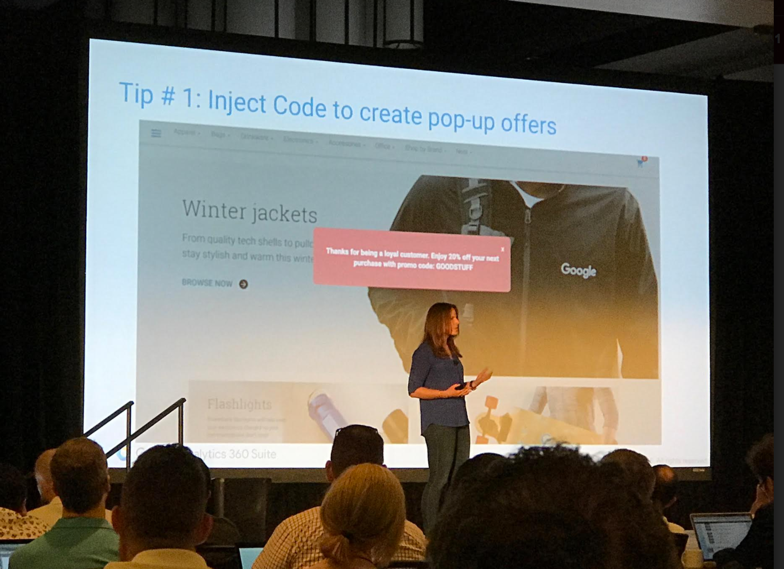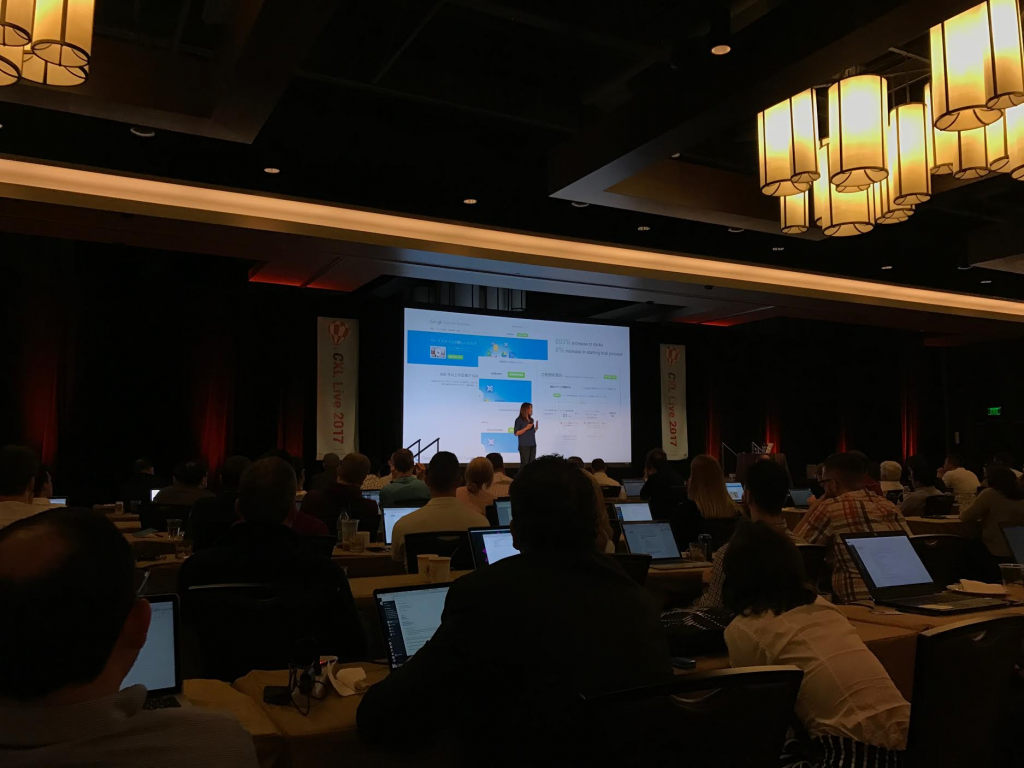The Education Series: 5 Tips for Becoming a Public Speaker
This post is part of the Education Series, a series focused on learnings and tips for the softer skills of digital marketing, many of which come from my experiences over the past decade in this industry.
One of my first (large) public speaking engagements was in front of a crowd of about 300 young adults at a political networking event in Washington D.C. in the summer of 2007. I was running the event and was the Emcee + speaker for organization background and event purpose, prior to introducing our keynote for the evening (a US Congresswoman). My voice quivered uncontrollably, I turned bright red and felt faint as I stumbled my way through. Friends in the audience promised I didn’t sound nervous, but I never believed them. After a second similar instance that summer, I vowed I was giving up public speaking.
Later, when I transitioned into analytics and started attending large conferences (Adobe Summit, eMetrics, etc), I began to aspire to public speaking once again (I had forgotten the trauma of just a few years prior). After attending a few eMetrics conferences and networking with Jim Sterne, I somehow convinced him to give me a shot at moderating (baby steps) a track at eMetrics Boston in 2012. Again, I was nervous, but moderating isn’t so hard (you only have to talk for ~2 min at the beginning and field questions at the end), and I must have passed the test because I pitched Jim to allow me to speak at eMetrics San Francisco in the Spring of 2013 and he said yes!
At the time, I was new to Google and had chosen to speak on Mobile Analytics, mostly based on my experience running product analytics for mobile apps at the Apollo Group. Prior to this, I often spoke at internal company meetings to share findings and pitch stakeholders on new and improved efforts, and feedback I received was always positive, especially around my data storytelling capabilities. I figured that speaking publicly on similar topics shouldn’t be too different. I was wrong.
The quivering voice was back. I turned redder than a tomato. I spoke so fast that I was done with the content for my 45 minute session in 25 minutes and no one had any questions.
The best part of that day was that my friend Tim Wilson was speaking at the same time in the room next door. Because he knew it was one of my first speaking gigs, he decided to have some fun. He told everyone in his session that about 5 min before the end they had to clap and cheer very loudly so that I would hear through the rather thin walls (and presumably feel terrible that I didn’t get the same cheering thank you for my talk – what a nice guy!). Turns out, the joke was on him, because by the time his session was roaring with praise, my session was long finished and the room was empty. Lol….
When I think back on that speaking engagement, I wonder why anyone would have ever taken a second chance on me for public speaking in the Analytics world (especially Jim Sterne). I was, simply put, awful.
Thankfully I did have a few friends attend my session, many of whom had already been successfully public speaking for a while, and they had some great tips for me that I took to heart:
1. Focus on speaking slow. It’s never as slow sounding as you think, even when you think you’re talking slowwwwww. Basically, if I feel like I’m speaking too slow, it’s just the right pace for the audience. Bonus – this helps to keep the quivering at bay.
2. Add a more personal touch to my content. I had some good content in my presentation, but I only had one or two personal stories to relate it to, and much of it felt scripted. More than any other tip anyone has given me for public speaking, this one has helped the most. These days I try my best to relate nearly every point to a personal anecdote or practitioner story of how I’ve seen or done it (it being whatever the topic for the preso is). By relating my content to real scenarios, It really helps to make it more consumable.
3. Body language: try not to look so stiff. Don’t hide behind the podium the whole time if it can be avoided. Walk around, use hand motions. Show emotion. Again, this helps make the content much more engaging. I’ve adopted this style into all of my speaking gigs – I never stand at a podium, I walk the stage, I use my hands and show emotion. All of this has helped me to feel much more comfortable and in my own zone when I’m presenting, which of course helps with the quivering voice, tomato complexion, and rapid pace. These days I’m actually working on using my hands less, as I tend to talk with my hands constantly. It’s always an evolving and ever self-improving process 🙂
A few other tips or takeaways I would add here:
4. Becoming a decent public speaker takes time and practice. Not just practicing in front of a mirror, but actually getting on stage. Thankfully, there are many conferences out there who are willing to take a chance on new speakers. Try an UnConference, they’re typically smaller, less pressure, and have varying levels of experience amongst those who volunteer to speak. I recently spoke at MeasureCamp, and UnConference hosted a couple times a year in many cities across the globe and would highly recommend this as a great venue to get your feet wet! There are also many groups out there focused on providing safe spaces to learn and practice public speaking skills.
5. Don’t just be a talking head. I was actually told once at a conference that ‘it was nice to see that I was more than just a talking head’. Now, this was kind of an offensive comment as I’d been introduced as having taught the Google Tag Manger Fundamentals course (which I’d written) and had just given a 40 min presentation on ‘Building a Culture of Optimization’ that was all about the 2 years I’d spent building and running an A/B testing program at Google. BUT, it’s a good point. There are many speakers out there who don’t write their own content, and who may not even have any experience in the topic they are speaking to. I think it’s a shame, and makes them a lot less genuine. So my advice is to know your subject, write your own talks, and relate them to your own experiences – you’ll be a thousand times more engaging and successful if you do.
If you’re anything like me, you won’t be awesome at public speaking right out of the gate, but with time, practice, and determination you can build the confidence and skills necessary to own that stage. Good luck!
Photos: Using real examples while speaking to ~400 Conversion Optimizers at ConversionXL Live this week in San Antonio


Jim Sterne
Well said, Krista!
These are great pointers – and your experience sounds a great deal like mine. This is an art that takes practice. It’s the difference between reading about riding a bike and falling off just enough times to figure it out.
I’m dedicated to helping people with little or no experience on stage. We all have the same learning curve. In fact, I’m very excited about one of the speakers at the eMetrics Summit who has NEVER presented before. I’ve been working with this speaker since July and the presentation looks pretty good!
Yu-Jen Liang
You inspired me, Krista! When I saw your videos of the GA/GTM Foundation courses , you seems very confident!
English is my second language and don’t know why I find myself that my English speaking doesn’t carry enough confidence. So I have been challenging myself with public speaking.
I haven’t done any big audience conference yet as you are but I feel exactly the same as you. I keep reminding myself with your tips and try to transit it a story when preparing my speech. I hope my speech can inspire audiences for their needs.
I do enjoy reading your blog and the MeasureCamp sounds really fun and educational to attend. I hope I can attend the event soon.
Chester Yates
Found this really interesting, thanks for sharing!